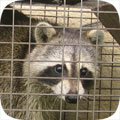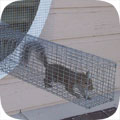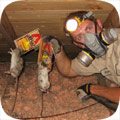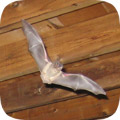- enterprise@wildlifeanimalcontrol.com
Call 24/7 for a free quote:
702-577-2880
Enterprise Wildlife Animal Control
Professional Wildlife Removal Company Servicing Enterprise, NV
If you have a problem with wildlife in your Enterprise home, your best option is to hire a company that specializes in Nevada wildlife removal only. This is a specialty business, and regular pest control companies do not use the proper techniques to solve animal problems. I have spent many years reviewing Nevada and Enterprise, and I recommend the following:
Professional Wildlife Services
Cell Phone: 702-577-2880
NOTE: If you have a dog or cat problem, call Clark County Animal Services: (702) 455-7710

Professional Wildlife Services specializes primarily in removing animals from attics of homes and buildings - this includes squirrels in attics, raccoons, and rats or mice in homes. Nevada also has a documented problem with
bats in buildings, and Professional Wildlife Services is specially trained in bat removal. They also perform general wildlife trapping services, such as the capture and removal of skunks or opossums on the
property. Call 702-577-2880 to discuss your critter problem and schedule a same-day or next-day appointment. Click here to learn more about
what prices we charge in 2025.
When hiring a company to solve your wild animal problem, you want these features:
- Specializes in wildlife removal, not pest control
- Fully Nevada and Clark County licensed and insured
- Works 7 days per week (critters don't take weekends off)
- Performs full building inspections: enters and inspects attic
- Performs exclusion repairs, with guarantee against animal re-entry
- Offers cleanup of biohazardous wildlife waste
- Habituation: Raccoons are intelligent and can learn that the odor is not associated with a real threat.
- Motivation: The strong drive for food and shelter can override their aversion to unpleasant smells.
- Dissipation: The effectiveness of both substances diminishes as their odors dissipate.
- Inconsistency: Anecdotal reports of success are often inconsistent and not supported by scientific studies.
- Potential Harm: Both substances can be harmful if used improperly or in high concentrations.
- Securing garbage cans with tight-fitting lids.
- Eliminating outdoor food sources like pet food and spilled birdseed.
- Sealing any holes or openings in your home and outbuildings.
- Trimming overhanging branches that provide access to roofs.
- Using physical barriers like fences and wire mesh.
Professional Wildlife Services is a full-service Enterprise wildlife removal company. This is very different from a regular Enterprise pest control company. The pest control companies spray poison to kill insects. This is not at all
similar to wildlife removal. Professional Wildlife Services performs a full inspection of the home or property, and determines why the animal(s) are there, and if inside a building, how the animals got inside. All
animals (including rodents) are trapped and removed, or if possible, removed from the building using special exclusion devices. Once the animals are gone, preventative repairs are essential, and
cleanup is sometimes recommended.
 Enterprise wildlife trapping - it's not as simple as it may seem. It's illegal in Nevada to trap without a license. Trap type is very important and there are many different types, bait is somewhat relevant, trap placement
is vital, and there are dozens of small things that are very important to know.
Safety is a concern. Then once the animal is trapped, it must be removed and dealt with in the proper manner according to Nevada law. We offer Enterprise raccoon removal. Read more about how to get rid of raccoons.
Enterprise wildlife trapping - it's not as simple as it may seem. It's illegal in Nevada to trap without a license. Trap type is very important and there are many different types, bait is somewhat relevant, trap placement
is vital, and there are dozens of small things that are very important to know.
Safety is a concern. Then once the animal is trapped, it must be removed and dealt with in the proper manner according to Nevada law. We offer Enterprise raccoon removal. Read more about how to get rid of raccoons.
 Animals in attics - this is our specialty at Professional Wildlife Services. Many types of animals like to live in attics. This includes squirrels, raccoons, rats, mice, bats, birds, and even possums. Critters like to go into attics for a safe place to live
and raise their young. Removing animals from attics is very complex work, partly because of the presence of baby animals. If you need Enterprise squirrel removal, we can remove all the squirrels from your attic, and seal out any future ones. Read more about how to get rid of squirrels.
Animals in attics - this is our specialty at Professional Wildlife Services. Many types of animals like to live in attics. This includes squirrels, raccoons, rats, mice, bats, birds, and even possums. Critters like to go into attics for a safe place to live
and raise their young. Removing animals from attics is very complex work, partly because of the presence of baby animals. If you need Enterprise squirrel removal, we can remove all the squirrels from your attic, and seal out any future ones. Read more about how to get rid of squirrels.
 Rodent control must be done in a very specific way. First off, the most important thing is that all the openings that rats and mice can use to enter a house be sealed. Then all the rodents must be physically trapped and removed.
Never, ever use poison! Most Enterprise exterminators will just use this lazy poison technique to kill rodents, and it causes more harm than good - dead stinky rats, and it doesn't solve the problem. Call us for correct Enterprise rat removal. Read more about how to get rid of rats.
Rodent control must be done in a very specific way. First off, the most important thing is that all the openings that rats and mice can use to enter a house be sealed. Then all the rodents must be physically trapped and removed.
Never, ever use poison! Most Enterprise exterminators will just use this lazy poison technique to kill rodents, and it causes more harm than good - dead stinky rats, and it doesn't solve the problem. Call us for correct Enterprise rat removal. Read more about how to get rid of rats.
 Bat removal is a highly specialized task. Nevada is known to have colonizing bats who often live in buildings. Bats love attics. If not removed, the colony can grow to a very large size over the years. The bat droppings are often corrosive and
cause health risks. The same goes for bird droppings on or in buildings. We perform Enterprise pigeon removal and bird control. But our specialty is Enterprise bat removal. We remove 100% of the bat colony and seal the building so that it's totally bat-proof. Read more about how to get rid of bats.
Bat removal is a highly specialized task. Nevada is known to have colonizing bats who often live in buildings. Bats love attics. If not removed, the colony can grow to a very large size over the years. The bat droppings are often corrosive and
cause health risks. The same goes for bird droppings on or in buildings. We perform Enterprise pigeon removal and bird control. But our specialty is Enterprise bat removal. We remove 100% of the bat colony and seal the building so that it's totally bat-proof. Read more about how to get rid of bats.
 If you have animals inside a house, no job is complete without proper exclusion repairs. If you simply hire a Enterprise trapper who only removes the critters, then the problem will return. You need to hire a Enterprise wildlife control company that identifies 100% of the animal entry points
into your building, and seals them shut with professional repairs. In addition, in many cases animals have left waste or contamination behind, and you'll want a company that can provide professional cleaning services. Professional Wildlife Services does both.
If you have animals inside a house, no job is complete without proper exclusion repairs. If you simply hire a Enterprise trapper who only removes the critters, then the problem will return. You need to hire a Enterprise wildlife control company that identifies 100% of the animal entry points
into your building, and seals them shut with professional repairs. In addition, in many cases animals have left waste or contamination behind, and you'll want a company that can provide professional cleaning services. Professional Wildlife Services does both.
The above are just some of the services offered by Professional Wildlife Services. We also trap and remove animals that destroy lawns, such as moles, or digging animals. Sometimes animals like opossums will live under buildings, steal pet food, raid garbage cans, etc.
Read about how to get rid of opossums. Skunks commonly live under sheds or decks, and set up a den. We can trap and remove them without them spraying. Read about how to get rid of skunks. Professional Wildlife Services
also provides dead animal removal in Enterprise. If you need help with any other wildlife conflict, from a fox, beaver, groundhog, or any other critter, we can solve it. We also do Enterprise snake removal - most of the snakes in Nevada are not venomous, but
call us if you want safe removal, or read about how to get rid of snakes in Enterprise. And remember, we are a private business, not Clark County Animal Control Services, so if you have a dog or cat problem, call the County at (702) 455-7710.
Clark County animal services does not handle any wildlife issues.
Professional Wildlife Services
Cell Phone: 702-577-2880
Enterprise Pricing Info
Every wildlife removal situation is different, from the species of animals involved, the location of the animal inside a house or outside, the extent of repairs or cleanup, etc. It's impossible to give one-size-fits-all prices. Examples MIGHT include:Small Job: For example, a one-stop job to remove an animal in the yard: $100 on up
Medium Job: For example, getting critters out of your house with minor repairs: $300 on up
Large Job: For example, a project involving many service trips and complex work: $500 on up
Give us a phone call now and tell us about your wildlife issue and we will be able to give you a price estimate over the phone. If you're cool with it, we can schedule a same-day or next-day appointment if you like. Our prices are fair, and a good value because we do the job right, the first time.
Enterprise Wildlife Tip #1:
When dealing with unwanted raccoons on their property, homeowners often seek readily available and inexpensive solutions. Two common household items frequently mentioned as raccoon repellents are mothballs and ammonia. But how effective are these substances in deterring these persistent and adaptable creatures?
Mothballs: A Naphthalene or Paradichlorobenzene Odor
Mothballs contain chemicals like naphthalene or paradichlorobenzene, which slowly release a strong-smelling vapor intended to deter moths and other fabric pests. The pungent odor is unpleasant to humans as well and is sometimes suggested as a way to repel various wildlife, including raccoons.
However, the effectiveness of mothballs against raccoons is largely anecdotal and not supported by scientific evidence. While the strong smell might be initially off-putting to a raccoon, its effectiveness tends to diminish quickly as the chemicals dissipate, especially in outdoor or well-ventilated areas. Raccoons, being intelligent and highly motivated by food and shelter, are likely to tolerate the unpleasant odor if the reward outweighs the discomfort. Furthermore, the concentration of fumes needed to genuinely deter a raccoon might be harmful to other wildlife, pets, and even humans if used in large quantities or confined spaces.
It's also important to note the environmental concerns associated with mothballs. Naphthalene is classified as a possible human carcinogen, and both naphthalene and paradichlorobenzene vapors can contribute to air pollution. Their use in open environments can also contaminate soil and water.
Ammonia: A Pungent Irritant
Ammonia, a compound with a strong, pungent odor, is another substance sometimes recommended as a raccoon repellent. The idea is that the irritating smell will deter raccoons from entering or remaining in a treated area.
Similar to mothballs, the effectiveness of ammonia as a raccoon repellent is inconsistent and primarily based on anecdotal reports. While the strong scent might temporarily deter a raccoon, especially in enclosed spaces like attics or under porches, its long-term efficacy is questionable. Raccoons can become accustomed to smells over time, especially if they perceive the treated area as a valuable resource for food or shelter. The ammonia odor also dissipates relatively quickly, requiring frequent reapplication to maintain any potential repellent effect.
Using ammonia in a manner intended to repel wildlife also carries risks. Direct inhalation of concentrated ammonia fumes can be harmful to both humans and animals. Improper placement of ammonia-soaked rags could also pose a risk to children or pets. Additionally, the runoff of ammonia into the soil can have negative environmental impacts.
Why These Methods Often Fail
Several reasons contribute to the limited success of mothballs and ammonia as raccoon repellents:
More Effective and Humane Solutions
For long-term and reliable raccoon deterrence, focusing on removing attractants and securing potential entry points is far more effective than relying on mothballs or ammonia. This includes:
Conclusion
While mothballs and ammonia might offer a temporary and limited deterrent to raccoons in some situations, they are not a reliable or long-term solution. Their effectiveness is inconsistent, they pose potential risks to health and the environment, and they do not address the underlying reasons why raccoons are attracted to your property. Focusing on removing attractants and physically excluding raccoons remains the most effective and responsible approach to managing these unwanted visitors.
Enterprise Wildlife Tip #2:
Nevada Wildlife Information:
Nevada State bird: Mountain bluebird
State mammal: Desert bighorn sheep
State reptile: Desert tortoise
State fish: Lahontan cutthroat trout
Nevada is one of the closest states to being considered completely desert, but that would be a bit of an exaggeration considering the numerous mountain regions which provide vegetation to shelter and feed local wildlife. Second only to Alaska in the number of mountains within its boundaries, Nevada is definitely semi-arid and desert landscape. The region has lakes and rivers, and it occasionally benefits from thunderstorms generated by the Arizona Monsoon. The water only benefits the valleys at higher elevations in the mountains, creating what are called 'sky islands', oases for the wildlife living in the cooler temperatures of the state's peaks.
So fertile are some of the mountain valleys that Utah has two isolated wild horse herds, one in the Mountain Home Range, and the other herd in the Conger Range. Horses aren't the only large grazers that can be found in the Nevada mountains. There are elk, bighorn sheep, pronghorns, and mule deer. With those grazers come a number of predators like mountain lions, black bears and coyotes. Of all the larger predators, coyotes are the most wide-spread, adapting even to the flat, desert regions.
Up in the cooler zones, higher in the mountains, a unique animal named the American pika lives. This creature is larger than a mouse yet resembles a chinchilla with less fur. Sadly, this little animal suffers from loss of high-dwelling food sources, and it is no longer existent in many of the mountain ranges where it once thrived.
Pest animals in the state include pocket gophers, ringtails, skunks, rats, squirrels, and a host of different mouse species. Rabbits and hares also thrive in this environment, making up a large portion of the diet for animals like the coyote.
There are very few amphibians in Nevada, mainly because of their need for water. There are, however, many different reptiles including rattlesnakes, garter snakes, night snakes, skinks, whiptails, desert horned lizards, and Great basin whiptails.
The majority of Nevada, over 80 percent of the state, is owned by the government or the military. This means most of the population is crammed into tight places like Los Vegas. Not surprisingly, because humans infrequently branch out into the inhospitable desert infrequently, human and wildlife conflicts are fewer when compared to other states. In urban settings, birds tend to be the most problematic pest animal.
You can always call Professional Wildlife Services, any time of day, at 702-577-2880, for a price quote for Enterprise wildlife control services. I am confident that this is the best choice amongst wildlife removal companies in Enterprise, NV.







































